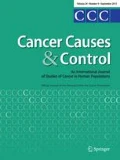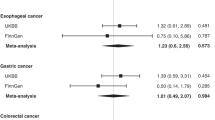Abstract
Objective
Folate and other methyl-group nutrients may play a key role in pancreatic carcinogenesis through their effects on DNA integrity. We examined the association between pancreatic cancer and intake of folate, vitamins B6, B12 and methionine in a large population-based case–control study.
Methods
Risk factor data were collected during in-person interviews with 532 pancreatic cancer cases diagnosed in 1995–1999 and 1,701 frequency-matched controls in the San Francisco Bay Area. Dietary history and supplement use were obtained using a semi-quantitative food-frequency questionnaire developed at Harvard University. Adjusted unconditional logistic regression was used to compute odds ratios (OR) and 95% confidence intervals (CI) as estimates of the relative risk.
Results
Total folate intake was inversely associated with pancreatic cancer (5th vs. 1st quintile: OR = 0.67, 95% CI = 0.48–0.93, p trend = 0.04). Increased vitamin B12 from food was positively associated with pancreatic cancer although risk estimates for quintiles 3–5 were similar (5th vs. 1st quintile: OR = 1.9, 95% CI = 1.3–2.6, p trend = 0.001). Intake of vitamin B6 or methionine was not associated with pancreatic cancer risk.
Conclusions
Our study provided some support for an inverse association between folate intake and pancreatic cancer risk. The increased pancreatic cancer risk with vitamin B12 intake from food warrants further investigation.
Similar content being viewed by others
References
American Cancer Society (2008) Cancer facts & Figs 2008. American Cancer Society, Atlanta
Jemal A, Siegel R, Ward E, Murray T, Xu J, Thun MJ (2007) Cancer statistics, 2007. CA Cancer J Clin 57:43–66. doi:10.3322/canjclin.57.1.43
Ries LAG, Melbert D, Krapcho M et al (2008) SEER cancer statistics review, 1975–2005. National Cancer Institute, Bethesda
Permuth-Wey J, Egan KM (2008) Family history is a significant risk factor for pancreatic cancer: results from a systematic review and meta-analysis. Fam Cancer. doi:10.1007/s10689-008-9214-8
Brand RE, Lynch HT (2006) Genotype/phenotype of familial pancreatic cancer. Endocrinol Metab Clin North Am 35:405–415. doi:10.1016/j.ecl.2006.02.015
Lowenfels AB, Maisonneuve P (2004) Epidemiology and prevention of pancreatic cancer. Jpn J Clin Oncol 34:238–244. doi:10.1093/jjco/hyh045
Chan JM, Wang F, Holly EA (2005) Vegetable and fruit intake and pancreatic cancer in a population-based case–control study in the San Francisco bay area. Cancer Epidemiol Biomarkers Prev 14:2093–2097. doi:10.1158/1055-9965.EPI-05-0226
Larsson SC, Hakansson N, Naslund I, Bergkvist L, Wolk A (2006) Fruit and vegetable consumption in relation to pancreatic cancer risk: a prospective study. Cancer Epidemiol Biomarkers Prev 15:301–305. doi:10.1158/1055-9965.EPI-05-0696
Nothlings U, Wilkens LR, Murphy SP, Hankin JH, Henderson BE, Kolonel LN (2007) Vegetable intake and pancreatic cancer risk: the multiethnic cohort study. Am J Epidemiol 165:138–147. doi:10.1093/aje/kwj366
Bae JM, Lee EJ, Guyatt G (2008) Citrus fruit intake and pancreatic cancer risk: a quantitative systematic. Pancreas 38:168–174. doi:10.1097/MPA.0b013e318188c497
Kim YI (1999) Folate and carcinogenesis: evidence, mechanisms, and implications. J Nutr Biochem 10:66–88. doi:10.1016/S0955-2863(98)00074-6
Choi SW, Mason JB (2000) Folate and carcinogenesis: an integrated scheme. J Nutr 130:129–132
Mason JB, Levesque T (1996) Folate: effects on carcinogenesis and the potential for cancer chemoprevention. Oncology (Williston Park) 10:1727–1736 (1742–3; 1743–4)
Mason JB, Choi SW (2000) Folate and carcinogenesis: developing a unifying hypothesis. Adv Enzyme Regul 40:127–141. doi:10.1016/S0065-2571(99)00037-0
Selhub J, Miller JW (1992) The pathogenesis of homocysteinemia: interruption of the coordinate regulation by S-adenosylmethionine of the re-methylation and transsulfuration of homocysteine. Am J Clin Nutr 55:131–138
Bailey LB, Gregory JF 3rd (1999) Folate metabolism and requirements. J Nutr 129:779–782
Friso S, Choi SW (2002) Gene-nutrient interactions and DNA methylation. J Nutr 132:2382S–2387S
Baghurst PA, McMichael AJ, Slavotinek AH, Baghurst KI, Boyle P, Walker AM (1991) A case–control study of diet and cancer of the pancreas. Am J Epidemiol 134:167–179
Silverman DT, Swanson CA, Gridley G et al (1998) Dietary and nutritional factors and pancreatic cancer: a case–control study based on direct interviews. J Natl Cancer Inst 90:1710–1719. doi:10.1093/jnci/90.22.1710
Stolzenberg-Solomon RZ, Pietinen P, Barrett MJ, Taylor PR, Virtamo J, Albanes D (2001) Dietary and other methyl-group availability factors and pancreatic cancer risk in a cohort of male smokers. Am J Epidemiol 153:680–687. doi:10.1093/aje/153.7.680
Skinner HG, Michaud DS, Giovannucci EL et al (2004) A prospective study of folate intake and the risk of pancreatic cancer in men and women. Am J Epidemiol 160:248–258. doi:10.1093/aje/kwh214
Larsson SC, Hakansson N, Giovannucci E, Wolk A (2006) Folate intake and pancreatic cancer incidence: a prospective study of Swedish women and men. J Natl Cancer Inst 98:407–413
Stolzenberg-Solomon RZ, Albanes D, Nieto FJ et al (1999) Pancreatic cancer risk and nutrition-related methyl-group availability indicators in male smokers. J Natl Cancer Inst 91:535–541. doi:10.1093/jnci/91.6.535
Schernhammer E, Wolpin B, Rifai N et al (2007) Plasma folate, vitamin B6, vitamin B12, and homocysteine and pancreatic cancer risk in four large cohorts. Cancer Res 67:5553–5560. doi:10.1158/0008-5472.CAN-06-4463
Larsson SC, Giovannucci E, Wolk A (2007) Methionine and vitamin B6 intake and risk of pancreatic cancer: a prospective study of Swedish women and men. Gastroenterology 132:113–118. doi:10.1053/j.gastro.2006.10.017
Hillman RS, Steinberg SE (1982) The effects of alcohol on folate metabolism. Annu Rev Med 33:345–354. doi:10.1146/annurev.me.33.020182.002021
Piyathilake CJ, Macaluso M, Hine RJ, Richards EW, Krumdieck CL (1994) Local and systemic effects of cigarette smoking on folate and vitamin B-12. Am J Clin Nutr 60:559–566
Gabriel HE, Crott JW, Ghandour H et al (2006) Chronic cigarette smoking is associated with diminished folate status, altered folate form distribution, and increased genetic damage in the buccal mucosa of healthy adults. Am J Clin Nutr 83:835–841
Chan JM, Wang F, Holly EA (2007) Pancreatic cancer, animal protein and dietary fat in a population-based study, San Francisco Bay Area, California. Cancer Causes Control 18:1153–1167. doi:10.1007/s10552-007-9054-0
Holly EA, Eberle CA, Bracci PM (2003) Prior history of allergies and pancreatic cancer in the San Francisco Bay area. Am J Epidemiol 158:432–441. doi:10.1093/aje/kwg174
Feskanich D, Rimm EB, Giovannucci EL et al (1993) Reproducibility and validity of food intake measurements from a semiquantitative food frequency questionnaire. J Am Diet Assoc 93:790–796. doi:10.1016/0002-8223(93)91754-E
Rimm EB, Giovannucci EL, Stampfer MJ, Colditz GA, Litin LB, Willett WC (1992) Reproducibility and validity of a expanded self-administered semiquantitative food frequency questionnaire among male health professionals. Am J Epidemiol 135:1114–1126
Willett WC, Reynolds RD, Cottrell-Hoehner S, Sampson L, Browne ML (1987) Validation of a semi-quantitative food frequency questionnaire: comparison with a 1-year diet record. J Am Diet Assoc 87:43–47
Subar AF, Thompson FE, Kipnis V et al (2001) Comparative validation of the block, willett, and national cancer institute food frequency questionnaires: the eating at America’s table study. Am J Epidemiol 154:1089–1099. doi:10.1093/aje/154.12.1089
Holmes MD, Powell IJ, Campos H, Stampfer MJ, Giovannucci EL, Willett WC (2007) Validation of a food frequency questionnaire measurement of selected nutrients using biological markers in African-American men. Eur J Clin Nutr 61:1328–1336. doi:10.1038/sj.ejcn.1602641
Colditz GA, Willett WC, Stampfer MJ et al (1987) The influence of age, relative weight, smoking, and alcohol intake on the reproducibility of a dietary questionnaire. Int J Epidemiol 16:392–398. doi:10.1093/ije/16.3.392
US Department of Agriculture (1993) Composition of foods-raw, processed, and prepared, 1963–1992. Agricultural handbook no. 8. Department of Agriculture, Government Printing Office, Washington (District of Columbia)
Breslow NE, Day NE (1980) Statistical methods in cancer research. Vol 1—the analysis of case–control studies. Intl Agency for Research on Cancer, Lyon
Willett W, Stampfer MJ (1986) Total energy intake: implications for epidemiologic analyses. Am J Epidemiol 124:17–27
Halsted CH, Villanueva JA, Devlin AM, Chandler CJ (2002) Metabolic interactions of alcohol and folate. J Nutr 132:2367S–2372S
Giovannucci E, Rimm EB, Ascherio A, Stampfer MJ, Colditz GA, Willett WC (1995) Alcohol, low-methionine–low-folate diets, and risk of colon cancer in men. J Natl Cancer Inst 87:265–273. doi:10.1093/jnci/87.4.265
Zhang S, Hunter DJ, Hankinson SE et al (1999) A prospective study of folate intake and the risk of breast cancer. JAMA 281:1632–1637. doi:10.1001/jama.281.17.1632
Vlajinac HD, Marinkovic JM, Ilic MD, Kocev NI (1997) Diet and prostate cancer: a case–control study. Eur J Cancer 33:101–107. doi:10.1016/S0959-8049(96)00373-5
Weinstein SJ, Stolzenberg-Solomon R, Pietinen P, Taylor PR, Virtamo J, Albanes D (2006) Dietary factors of one-carbon metabolism and prostate cancer risk. Am J Clin Nutr 84:929–935
Mayne ST, Risch HA, Dubrow R et al (2001) Nutrient intake and risk of subtypes of esophageal and gastric cancer. Cancer Epidemiol Biomarkers Prev 10:1055–1062
Anderson KE, Kadlubar FF, Kulldorff M et al (2005) Dietary intake of heterocyclic amines and benzo(a)pyrene: associations with pancreatic cancer. Cancer Epidemiol Biomarkers Prev 14:2261–2265. doi:10.1158/1055-9965.EPI-04-0514
Li D, Day RS, Bondy ML, Sinha R et al (2007) Dietary mutagen exposure and risk of pancreatic cancer. Cancer Epidemiol Biomarkers Prev 16:655–661. doi:10.1158/1055-9965.EPI-06-0993
Acknowledgments
This work was supported in part by the National Cancer Institute grants CA59706, CA108370, CA109767, CA89726 (E. A. Holly, PI) and by the Rombauer Pancreatic Cancer Research Fund. The collection of cancer incidence data for the UCSF study was supported by the California Department of Public Health as part of the statewide cancer reporting program mandated by the California Health and Safety Code Sect. 103885; the National Cancer Institute’s Surveillance, Epidemiology and End Results Program under contract N01-PC-35136 awarded to the Northern California Cancer Center; and the Centers for Disease Control and Prevention’s National Program of Cancer Registries, under agreement #U55/CCR921930-02 awarded to the Public Health Institute. The ideas and opinions expressed herein are those of the author(s), and endorsement by the State of California, Department of Public Health, the National Cancer Institute, and the Centers for Disease Control and Prevention or their Contractors and Subcontractors is not intended nor should be inferred.
Author information
Authors and Affiliations
Corresponding author
Rights and permissions
About this article
Cite this article
Gong, Z., Holly, E.A. & Bracci, P.M. Intake of folate, vitamins B6, B12 and methionine and risk of pancreatic cancer in a large population-based case–control study. Cancer Causes Control 20, 1317–1325 (2009). https://doi.org/10.1007/s10552-009-9352-9
Received:
Accepted:
Published:
Issue Date:
DOI: https://doi.org/10.1007/s10552-009-9352-9




